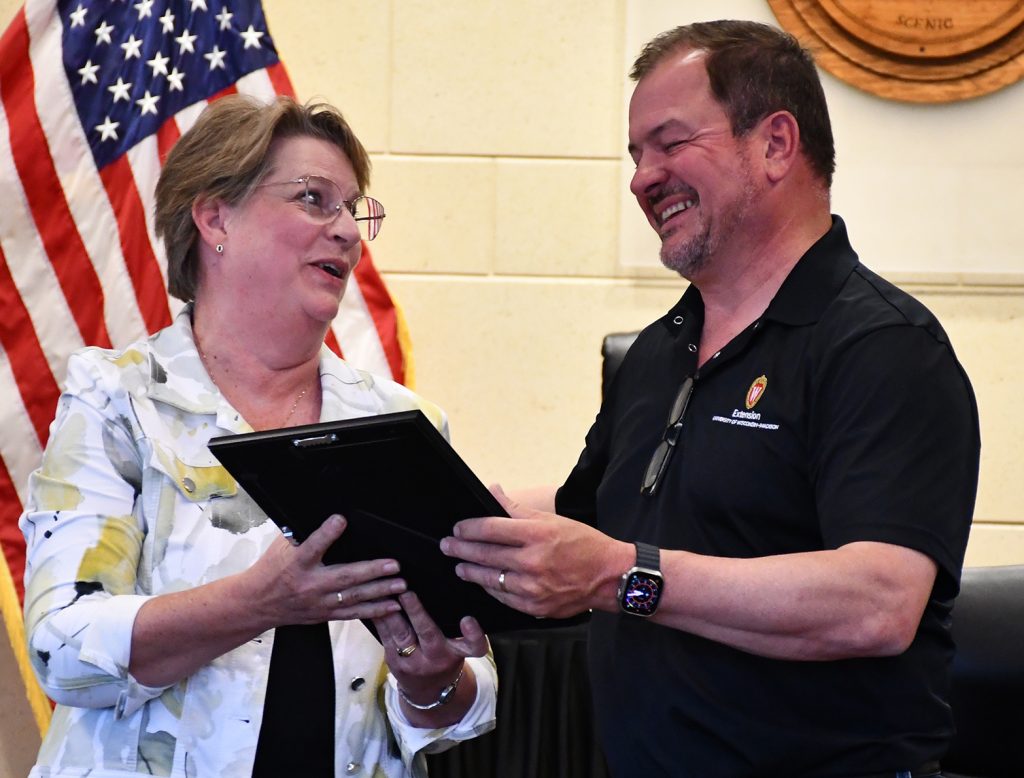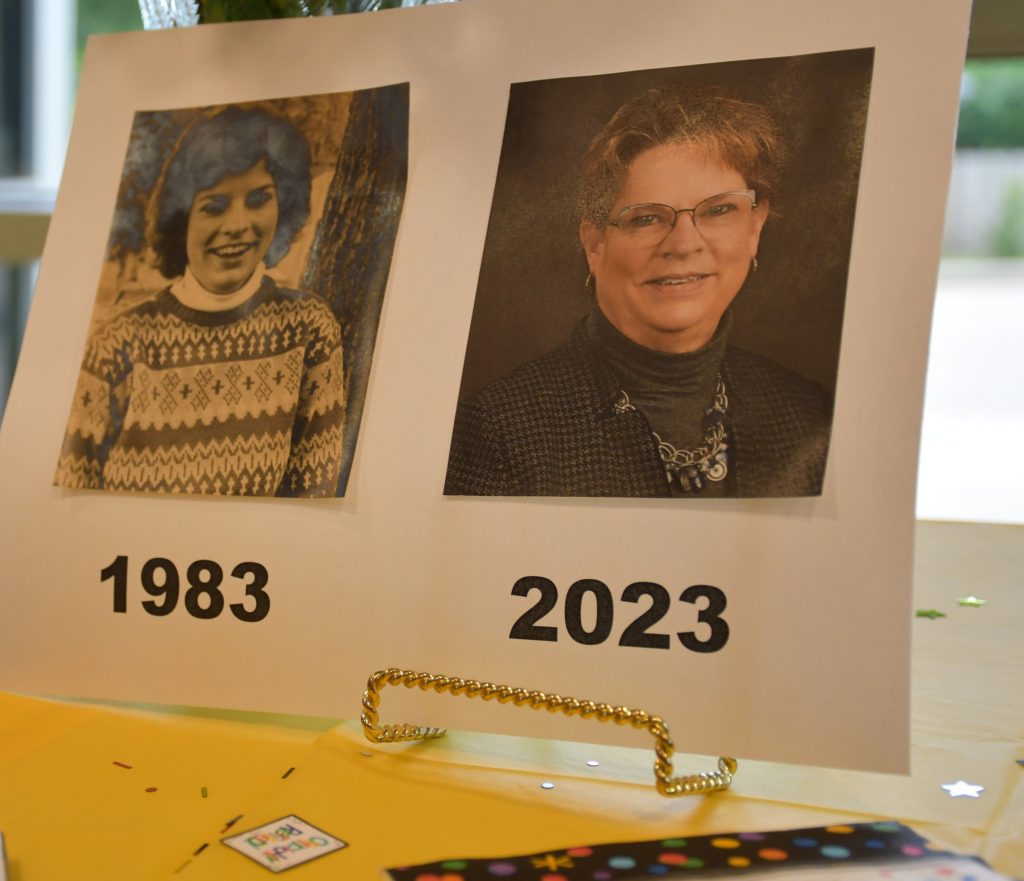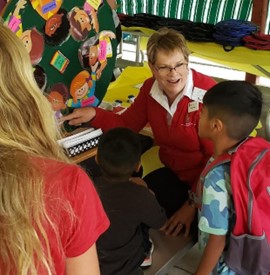Jeff Segebrecht estimates that Extension Educator Ruth Schriefer has personally helped thousands of people in southwest Wisconsin improve their finances. He knows this because as Program Director with the Work ‘n Wheels Car Loans Program he is frequently flagged down by people who’ve just acquired a car with a zero-interest loan from the program and they tell their story of how they secured a new means of transportation.
“And they always says thanks to Extension and Ruth too,” he said.
Whether helping financial clients navigate buying their first car or home, building the confidence of caregivers and parents, coaching dozens of 4-H camp counselors, or encouraging healthy aging in rural areas, Ruth Schriefer has made a profound impact on the lives of countless Wisconsinites in Pepin, Manitowoc, Dane, and Iowa counties. Extension invites you to celebrate Ruth Schriefer, a Human Development & Relationships Professor and Educator in Iowa County, on her 40th anniversary of working at Extension and her upcoming retirement.

Since 1983, Ruth has served as a home economist, 4-H agent, and financial coach, transforming lives and communities.
“Ruth was one of a few individuals I called ‘early adopters’ when I began my career here at UW–Extension. She listened to my vision, found value in the direction that the Human Development & Relationships Institute was headed, and always called or emailed me if she had questions, advice, or just a positive, inspirational message. Having a seasoned county educator email you in your first month on the job to say, ‘Excellent meeting,’ ‘Smart approach,’ or ‘Great idea’ meant more to me than she could imagine,” said Danielle Hairston Green, Human Development & Relationship Institute Director.

Read on to explore Ruth’s history, memories, and purpose behind her life of service with this question-and-answer:
What brought you to Extension?
I joined Extension in 1983 with a UW–Stout degree in Home Economics and a concentration in Extension Education. I was a second-generation, 9-year 4-Her when I was growing up, and we used Extension resources in Vernon County to support and enhance our farm, home, and family. In the education realm, I was committed to community-based education rather than formal classroom teaching, so Extension was a great fit as an initial career choice.
And what kept you here for 40 years?
As a young adult, I had no idea that my entire career would be with Extension, and I did explore other opportunities through the years. Instead of leaving the organization, I changed counties more than once, and in 1995, I made a significant change in my program area from 4-H Youth Development to Family Living Education. I also accepted leadership opportunities as they emerged, so I could learn more about the organization from a different perspective and contribute to it in a different way.
How has Extension and your work with Extension changed since you first started?
I think change in an organization is healthy, and that’s important because Extension has evolved over the decades. Change for us is influenced by many factors including federal and state budgets, administrative priorities, specialist research interests, county funding, and local needs including the environment and the economy. Families, farms, businesses, and communities each have their own set of change influences, and I hope as Extension educators—and Extension as an organization—that we have been and will continue to be models for navigating change.

Other changes over the years include having fewer staff in some counties around the state and more in others; working toward stronger focus in our positions rather than being generalists; reaching participants in multiple ways rather than primarily in person.
There have been some more tangible changes too – technology has evolved a lot! From electric typewriters to word processors to computers and the internet; from ETN to WisLine to Zoom; from mimeograph machines to color copiers; handwritten letters and articles turned over to our secretaries to very efficient and tech-savvy support staff.
What has stayed the same?
The foundation of Extension remains the same over time: we improve people’s lives with research-based knowledge to strengthen the social, economic, and environmental well-being of families, communities, and agriculture. In our state, it’s the Wisconsin Idea.

Ruth’s Extension career
– Summer 1983: Hired initially for Interim Home Economist/4-H Agent in Pepin County
– Moved to Manitowoc County as one of two 4-H Youth Development Agents
– Moved to Dane County and served as one of 4-H Youth Development Agents
1995-2023: Served in Iowa County as a Family Living /Human Development & Relationships Educator
– Named interim program director for Extension’s Family Living portfolio
– Served on nEXTgen reorganization
– Chair of UW–Madison Extension Faculty
Tell me about a meaningful memory or impact you’ve made working at Extension.
I am so proud of the program participants I’ve had, and I love hearing about their successes when our paths cross in the community: paying off a car loan, buying a house, building confidence as a caregiver, leading a coalition, or communicating with a family member about end-of-life plans. On a broader scale, I’m excited about our Healthy Aging in Rural Towns (HeART) Coalition and what we’ve accomplished to benefit older adults and their families in recent years.
What words of wisdom do you have to share with fellow Extension educators or other staff?
Education is what we do. Whether we are doing direct or indirect teaching, supporting educators, creating content, managing staff and/or budgets, leading or supervising, ultimately, we are working together to improve people’s lives wherever they live or work.
People matter – those we work for, those we work with, and those who value our work.
I have had an amazing career at Extension, and I will remember the good times fondly. Of course, there have been challenges along the way, both personally and professionally. Challenges help build character and strength.
What are your plans for retirement?
I am very much looking forward to spending time around our house and yard, with the herd and flock at our farm, and on several unfinished quilting projects in my sewing room. My husband, Gene, and I have parents in Dodgeville and in Westby who are looking forward to having more of my attention. And we’ll be making time for trips to North Carolina where our son Haakon will be working after finishing his master’s degree at Duke University.



